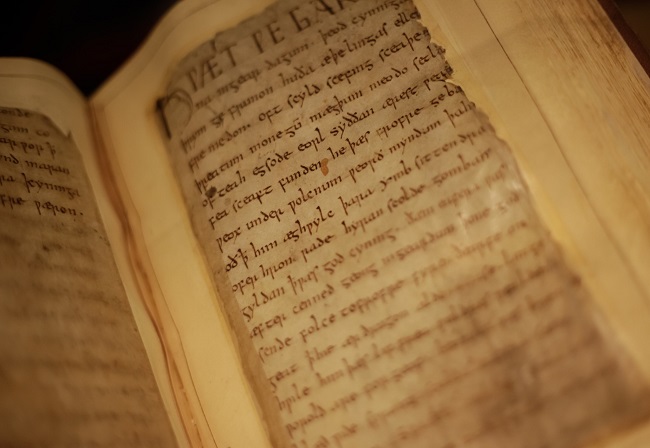Mar 30, 2025
Mar 30, 2025
Epics-5
In this episode let us read about another epic poem “Beowulf”, an epic of heroic proportions from Anglo-Saxon England. Beowulf is a poem that stands as one of the most important works of Old English literature. Composed in the 8th to 11th centuries AD, this renowned poem tells the tale of a heroic warrior named Beowulf. It offers readers a glimpse into the rich oral tradition of the Anglo-Saxons, showcasing themes of heroism, honor, and the eternal struggle between good and evil.

Beowulf is a Geatish warrior referring to the people from the kingdom of Geatland, an ancient region in what is now modern-day Sweden who travels from his homeland to aid the Danes against the monstrous Grendel. Grendel is a monstrous creature and one of the primary antagonists. He is depicted as a descendant of the biblical figure Cain, cursed by God due to his ancestor's sin. Grendel is a fearsome and violent being, described as a gigantic and powerful creature. He dwells in the marshes and moors, living in isolation and despising human society. Grendel becomes a terror to the Danish kingdom ruled by King Hrothgar, attacking Heorot, the great mead-hall, during the night and killing the sleeping warriors. His attacks continue for many years, causing great suffering and loss for the Danes. Beowulf, the hero of the poem, arrives from Geatland to help Hrothgar and his people. He confronts Grendel in a fierce battle, ultimately defeating the monster by tearing off his arm. Grendel flees back to his lair, where he eventually succumbs to his injuries and dies. Grendel is often seen as a representation of evil, chaos, and the dark forces that threaten civilization. His character serves as a contrast to the heroic qualities of Beowulf, highlighting the bravery, strength, and righteousness of the protagonist.
Beowulf's tale focuses on his heroic exploits and his larger-than-life status as a warrior. Beowulf is motivated by a sense of duty and the desire for glory and honor. His heroism is driven by his commitment to protecting his people and proving his worth as a warrior. Beowulf is depicted as a legendary hero with supernatural strength and unwavering loyalty to his people. Beowulf represents the spirit of the warrior culture and the historical context of Anglo-Saxon England. They embody the values of honor, loyalty, and heroism, albeit in different ways and within distinct narrative frameworks.
The author of "Beowulf" remains unknown, and the poem was likely passed down through generations of oral storytelling before being written down. It reflects the cultural and historical context of the Anglo-Saxon period, a time when warrior culture and the pursuit of fame were highly valued. The poem embodies the values and ideals of its time, shedding light on the lives and beliefs of the Anglo-Saxon people.
"Beowulf" is composed in Old English, utilizing a distinct meter called alliterative verse. The lines of the poem are divided into two half-lines, each containing two stressed syllables and a varying number of unstressed syllables. The half-lines are linked through alliteration, with the stressed syllables in the first half-line and the initial stressed syllable in the second half-line sharing the same initial sound. This repetition of sounds creates a rhythmic and musical quality, enhancing the oral performance of the poem.
Few verses from Beowulf:
1. "Hwæt! We Gardena in geardagum" (Lo! We have heard of the glory of the Spear-Danes.) The opening line of "Beowulf," known as the "Hwæt" or "So!" passage, serves as a call to attention and establishes the heroic tone of the poem. It announces the grandeur and fame of the ancient Danish kings, igniting the listener's anticipation for the heroic narrative that follows.
2. "Hæfde landwara | leoda fela" (The land-guardian had many people). This line refers to Grendel, the monstrous antagonist of the poem, describing him as the guardian of the land who terrorizes the Danish people. It signifies the threat faced by the kingdom and highlights the importance of Beowulf's arrival to challenge and defeat the malevolent creature.
3. "Þær him hygelac læg" (There Hygelac lay). This verse refers to the death of Hygelac, Beowulf's king and uncle. It marks a significant moment in the poem, where Beowulf assumes leadership and becomes the ruler of the Geats. This line showcases the theme of succession and the passing of power from one generation to the next.
To end, "Beowulf" remains a monumental work that captures the spirit and ethos of Anglo-Saxon England. Its unknown author crafted a compelling tale of heroism and adventure, encapsulating the values and ideals of a bygone era. Through its unique meter and structure, the poem exemplifies the rich oral tradition of the time. "Beowulf" continues to inspire readers and scholars, serving as a testament to the enduring power of storytelling and the resilience of the human spirit.
Continued to Next Page
Image of the manuscript of Beowulf in the British Library London (c) istock.com
24-Jun-2023
More by : Dr. Satish Bendigiri